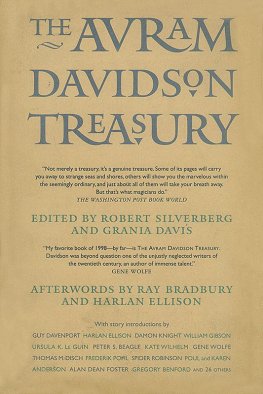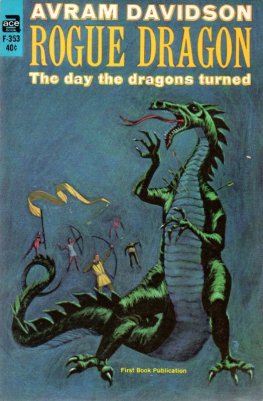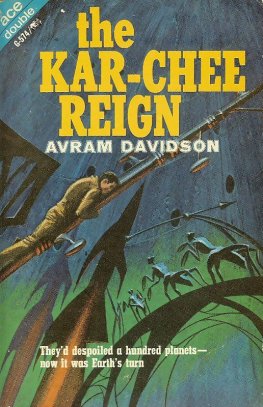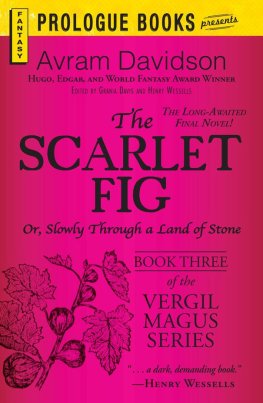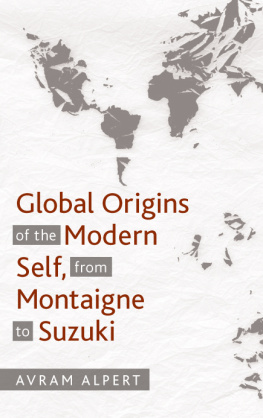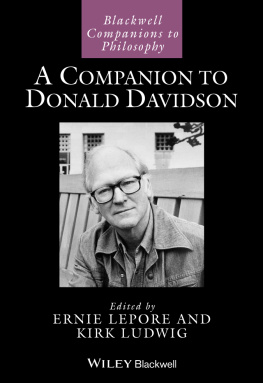Avram Davidson - Vergil in Averno
Here you can read online Avram Davidson - Vergil in Averno full text of the book (entire story) in english for free. Download pdf and epub, get meaning, cover and reviews about this ebook. genre: Romance novel. Description of the work, (preface) as well as reviews are available. Best literature library LitArk.com created for fans of good reading and offers a wide selection of genres:
Romance novel
Science fiction
Adventure
Detective
Science
History
Home and family
Prose
Art
Politics
Computer
Non-fiction
Religion
Business
Children
Humor
Choose a favorite category and find really read worthwhile books. Enjoy immersion in the world of imagination, feel the emotions of the characters or learn something new for yourself, make an fascinating discovery.

- Book:Vergil in Averno
- Author:
- Genre:
- Rating:4 / 5
- Favourites:Add to favourites
- Your mark:
- 80
- 1
- 2
- 3
- 4
- 5
Vergil in Averno: summary, description and annotation
We offer to read an annotation, description, summary or preface (depends on what the author of the book "Vergil in Averno" wrote himself). If you haven't found the necessary information about the book — write in the comments, we will try to find it.
Vergil in Averno — read online for free the complete book (whole text) full work
Below is the text of the book, divided by pages. System saving the place of the last page read, allows you to conveniently read the book "Vergil in Averno" online for free, without having to search again every time where you left off. Put a bookmark, and you can go to the page where you finished reading at any time.
Font size:
Interval:
Bookmark:
Avram Davidson
Vergil in Averno
Whereas in other cities they had taken him to see the bears and lions, the dancing girls and dancing boys, or the chambers with the painted walls, all quite commonly done, and in one city they had done a thing by no means common: they had shown him the treasury, crammed with rubies of Balas and of Balas-shan, male spider rubies and females of the same, diamonds and adamants and pearls the size of babies fists, ancient golden anklets and amulets and silver newly brightly minted, chryselephantine with turquoise and sapphire and stone of lapis lazuli here they had taken him, with every mark of respect and favor, to see the torture-chambers instead.
He had gone.
Had he not gone, would they not have tortured?
Besides: Are not the pains of the few to be preferred to the pains of the many? Did not the distant Idumaeans say, Pray for the welfare of the Empire, for were it not for fear of it, men would swallow one another up alive? And yet the Idumaeans loved the Empire not.
But as for torture. . still. . In Rome, the Consul Pretorius, who kept the kings sword (King! as though the title had not long ago been subsumed into a vaster one!) was able with his words and ways alone to wring secrets out of the most forsworn to silence, and in Athens old Illyriodorus did as much with dreams (though these were different secrets, clean different ones indeed), but in Averno different ways were kept (and clean different ones they were, too; if not precisely clean). They took Vergil to see the torture chambers, as one would go to see the bears.
There were no such chill dungeon deeps as had caused the captive in the Histories to exclaim, How cold are your baths, O Romans! All was well warmed, all along the deep stone steps (deeper, even, in the center of each, worn, probably, by the passage of many feet over the passing of many years) all along the deep stone steps and long stone corridors, and, indeed, well lighted as well. His host had paused to take up a wax tablet which stood upon a stand, as though he were taking up a menu; his host was the Magnate Brosa Brosa. Hm, said he, this morning they have someone named the name meant nothing to Vergil, whatever it was who stands accused of conspiracy and interloping. He raised his eyebrows. Conspiracy and interloping, he repeated thoughtfully with slight change of emphasis. Cant have that.
He stood aside and gestured courteously, asked, Shall we go in, master?
They went in.
Vergil had gone in first, with some polite murmur, but he did not at first go in very far; for, the door closing behind them with a heavy thud that for some reason somewhat sickened him (as some sounds do), it was at first dim-dark. But even before his eyes regained full vision he had with him, always, of course, a source of light of his own, but did not care always, or even often, to make use of it even then he was able to see that, first, there was some glow of light from somewhere; next he saw, in that dim glow, evidently the man being put to the question horrid obliquity of phrase! a man, a young man, well muscled and unclad and arms upraised and wrists in chains; but -
At least he does not barber his armpits, said the magnate-host. . hanging, thus, that beautiful body, and face intent and in pain, the young man naked and in chains: Vergil pitied him with all his heart, what matter for the moment all philosophy and polity and prating of the welfare of the Res Publica, the Public Thing: the State? The muscles of the arms and breast and belly moved and played and writhed, the upper body bent forward and moved, the chain moved somewhat; somewhere near, a bellows sighed and sounded: and, gods! what mattered where he shaved or not?
Else we had not hired him. The soft voice of the host in Vergils ear. We want no perverts for this work, you know.
Light.
The young man all naked and all sweat was not the victim. He was the torturer. The chains were not those of bondage, he had merely wound them round his wrists for purchase as he forced the bellows to force the fire, working it to heat his instruments. It was, of sorts, a shock. The young mans pain was merely that of effort.
And when the actual prisoner, uncomely in body and in face, was lifted forward and fixed upon the frame, white hairs crawling upon bosom and belly even then attention and favor, even pity, certainly sympathy, once fast-centered, moved and changed with difficulty. For one long, unlovely moment it had seemed right to Vergil, and proper, that youth and beauty should torture old age and ugly. . and, or. . at least. . wrong that it should be obliged to tarry there to do so, for, clearly (from the torturers straining muscles and concerned face scarcely observed, the commencement of the question. . the questions. . When last did you conspire to admit interlopers unlicensed to the trade and commerce of the Very Rich City of Averno in violation of its strict and meritorious laws?) clearly, youth could take and took no pleasure in this association with age, and surely beauty would prefer the sunlight and the cooler air outside, the sweet smells of gardens and of fields to this hot room, dark, and fetid with sweat and fear. Clearly, surely, then (it seemed), age, ugly age, should at once confess and die and set youth free, unchained, to go forth once more into the light and air to play.
Then, suddenly, simul and semel with the first groan and scream, it came to him, Vergil, that there was outside no cooler air, no sweet smells, no gardens and no fields, little better light, and certainly little in the way of play: He was in Averno.
The very rich city.
How came he there?
Master in Philosophy. Master in Arts Magical. Adept of the First Three Grades at Grammarie. Passed Master on the Astrolabe. Astrologue, West of Corinth, and Astrologue, East of Corinth. The voice paused, continued. But not yet Incantor et Magus. The voice ceased. It had not asked a question; it had made a statement.
Vergil said, Not yet. Also a statement.
The man of the voice had entered the hot-wine shop a half-moment ahead of him, and only in that half-moment had Vergil half-realized (realized, that is, with half his mind) that the others striped robe had already been in the wine-shop lane when he himself turned into it. As for turning, the man had not turned up his face when Vergil had come to stand next to him. . indeed, could have stood nowhere much else, there being but that much little room at the small counter where the wine-pots squatted in their hot-water baths above the charcoal glow. Giving their orders as the dramster looked at each in turn, White and sweet, said one, Red and spicy, said the other. Vergil was that other, and this was no pre-arranged signal, to be responded to with some phrase such as I have the key to Memphis, countered with (perhaps) And I to Mizraim, such sports as boys employ to obtain entrance to clandestine gatherings of boys who cannot yet get girls. Had the dramster stood a bit nearer in offering the steamy cup with one hand and holding out the other for the two groats an ancient buffoonery among street-players: Spare two groats for the bath, boss? What bath? The one in Lucus wineshop. . Change the name for every street, it still drew its laugh from loiterers had this dramsters stance not made it necessary for Vergil to turn a bit to the left, he would not even have seen the other wine-drinkers face in profile: no extraordinary face, say of not quite three decades, with a sparse beard and large white teeth.
Vergil had raised his cup and lowered his face and, while he blew and sipped, this other, this one in the striped robe, as though murmuring a libation-prayer, began that recitation of titles which, after a mere moment, Vergil recognized as his own. Had this other, whoever he was, and no memory of this other moved Vergils mind, not even as the lightest of breezes moves the surface of a pool, had he expected some show of surprise or even curiosity? None was forthcoming. He might as well have been Vergils aunt, asking Has your sister come back from market?
Font size:
Interval:
Bookmark:
Similar books «Vergil in Averno»
Look at similar books to Vergil in Averno. We have selected literature similar in name and meaning in the hope of providing readers with more options to find new, interesting, not yet read works.
Discussion, reviews of the book Vergil in Averno and just readers' own opinions. Leave your comments, write what you think about the work, its meaning or the main characters. Specify what exactly you liked and what you didn't like, and why you think so.

